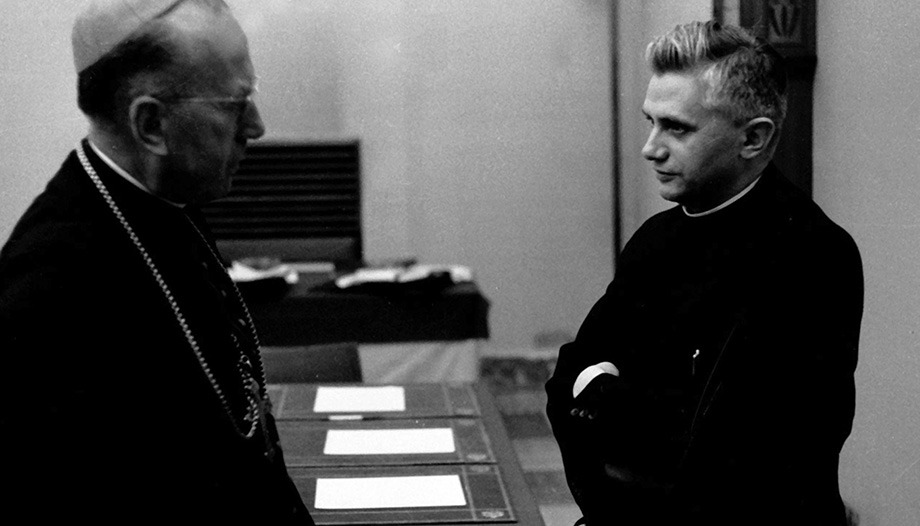The biography of any person usually offers, almost always, abundant clues to decipher the temperament, personality and even some of the main decisions taken by the biographer. This is also the case with Joseph Ratzinger - Benedict XVI.
For example, a biographical key that helps to understand the exhaustion that led him to resign is not only his advanced age, but above all the enormous wear and tear he experienced because of his intense, dedicated and uninterrupted work in the service of the universal Church in the more than thirty-one years he spent in Rome: first as a close collaborator of St. John Paul II at the head of the Congregation for the Doctrine of the Faith, beginning on November 25, 1981; and then, when Cardinal Ratzinger was already thinking of his well-deserved retirement, in the almost eight years of exhausting ministry as Vicar of Christ.
Children and youth
Joseph Ratzinger was born in the Bavarian town of Marktl, near the Inn River, on a day of great religious significance: Holy Saturday (April 16, 1927). The fact that he was baptized on the same day is already indicative of his spiritual and liturgical precocity (the Easter Vigil is the baptismal framework par excellence).
However, he spent his childhood and adolescence in Traunstein, a small town almost on the border with Austria, thirty kilometers from Salzburg. In this "Mozartian" environment, as he himself has defined it, he was educated humanly, culturally and musically under the Christian influence of his family. His father, a commissioner of the gendarmerie, came from an old family of farmers from Lower Bavaria, of modest economic condition. His mother, daughter of craftsmen from Rimsting, worked as a cook in several hotels before her marriage. Joseph is the youngest of three siblings. Maria, the eldest daughter, died in 1996, and Georg (89), a priest and musician, lives in Regensburg.
The education he received enabled him to overcome the harsh experience of the Nazi regime, hostile to the Catholic Church. The young Joseph saw with his own eyes how the Nazis beat a priest who was about to celebrate Mass. Paradoxically, and also seeing in his father the Christian rejection of Nazism, that complex historical situation ended up helping him to discover the truth and beauty of the faith.
Shortly before the end of World War II - the young Ratzinger was 16 years old at the time - he was forced to enlist in the auxiliary anti-aircraft services. This episode has been harshly criticized in some exaggeratedly critical biographies. This is the case of a first biographical sketch written by the Vaticanist John Allen, for whom resistance to Nazism was difficult and risky, but not impossible. But Joseph Ratzinger had the courage to defect in those circumstances, even though he risked being shot.
Priest and theologian
In any case, it was not political activism that was the fundamental inclination of the young Joseph Ratzinger, but study. Very soon he began to dedicate himself and to excel in what would later become his main task: the teaching of theology. From 1946 to 1951 he studied philosophy and theology at the Freising School of Philosophy and Theology and at the University of Munich. On June 29, 1951, together with his brother Georg, he was ordained to the priesthood. This was, as he would later say, the most important day of his life.
One year later, at the age of 25, he began teaching at the Freising University of Applied Sciences. His gifts as a teacher and researcher in theological science, particularly in the fields of anthropology and ecclesiology, soon came to the fore.
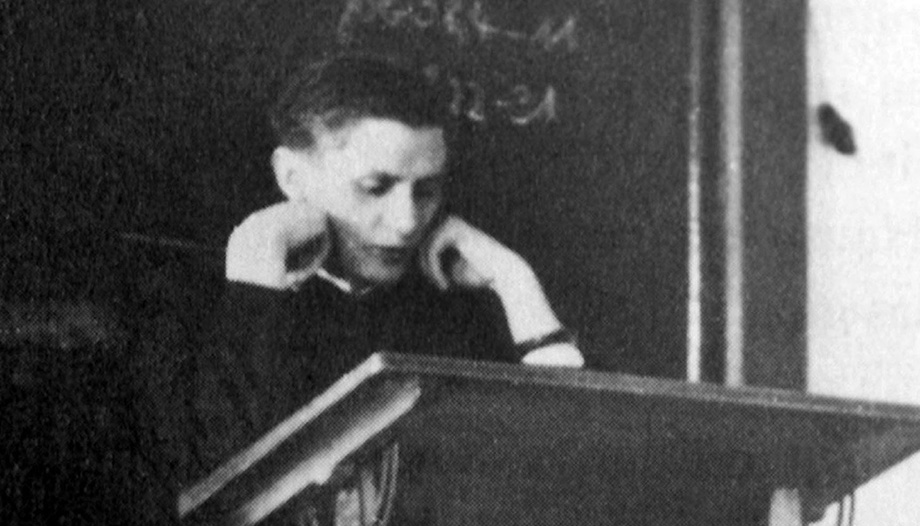
In 1953 he received his doctorate in theology with a dissertation: "People and house of God in the doctrine of the Church in St. Augustine". Four years later, under the direction of Professor Gottlieb Söhngen, he obtained teaching qualification with a dissertation on: "St. Bonaventure's Theology of History."
After teaching dogmatic and fundamental theology at the Freising School of Philosophy and Theology, he continued his teaching activity in Bonn from 1959 to 1963, in Munich from 1963 to 1966 and in Tübingen from 1966 to 1969. In the latter year he became professor of dogmatics and history of dogma at the University of Regensburg, where he also held the position of vice-rector.
Expert witness at the Council
From 1962 to 1965 he contributed to the work of the Second Vatican Council as an "expert". He attended the Council as a consulting theologian to Cardinal Joseph Frings, Archbishop of Cologne. Benedict XVI recounted how he came to participate in the Council by chance. When he was a professor at the University of Bonn, Cardinal Joseph Frings asked him to prepare the text of a conference he was to deliver in Genoa. Shortly thereafter, John XXIII called Cardinal Frings to Rome. The latter feared the worst. However, the Pope embraced him and said: "Thank you, Your Eminence; you have said what I wanted to say but could not find the words." And so it was that Cardinal Frings invited Professor Ratzinger to go with him to the Council as his personal assistant.
Joseph Ratzinger's contributions to the conciliar documents on the liturgy and the Word of God were key. His intense scientific activity would later lead him to hold important positions in the service of the German Bishops' Conference and the International Theological Commission.
Over the years, as a result of his prestige as a theologian and his work at the head of the Congregation for the Doctrine of the Faith, Ratzinger received numerous honorary doctorates: from the College of St. Thomas in St. Paul (Minnesota, USA) in 1984; from the Catholic University of Eichstätt (Germany) in 1985; from the Catholic University of Lima (Peru) in 1986; and from the Catholic University of Lima (Peru) in 1986. He received doctorates "honoris causa" from the College of St. Paul (Minnesota, United States) in 1984; from the Catholic University of Eichstätt (Germany) in 1985; from the Catholic University of Lima (Peru) in 1986; from the Catholic University of Lublin (Poland) in 1988; from the University of Navarra (Pamplona, Spain) in 1998; from the Free University of Mary Most Holy Assumption (LUMSA) (Rome) in 1999; from the Faculty of Theology of the University of Wroclaw (Poland) in 2000.
Some believe that Ratzinger had, as a theologian, a first liberal stage, but that at the end of the sixties he moved away from less secure theological currents. Together with Hans Urs von Balthasar, Henri de Lubac and other great theologians, he founded in 1972 the theological magazine "Communio.
Bishop of Munich and Cardinal
On March 25, 1977, Paul VI appointed him Archbishop of Munich and Freising. This was the end of his 18 years as a professor at some of the best public universities in Germany.
On receiving episcopal ordination on May 28, he became the first diocesan priest in 80 years to assume the pastoral governance of the great Bavarian archdiocese. As his episcopal motto he chose "Cooperator of truth."This is the key to interpreting the service that Ratzinger has rendered to the Church in its different facets in the service of truth. This is how he himself explained it: "On the one hand, it seemed to me to express the relationship between my previous task as a teacher and my new mission. Although in different ways, what was and remained at stake was to follow the truth, to be at its service. And, on the other hand, I chose this motto because in today's world the subject of truth is almost totally silenced; for it is presented as something too great for man and yet, if truth is missing, everything falls apart."
In the consistory of June 27, 1977, Pope Paul VI created the young Archbishop of Munich (who was then 50 years old) a cardinal with the presbyteral title of Our Lady of Consolation in Tiburtino.
In 1978 Ratzinger already participated in his first conclave: the one that would elect John Paul I on August 26. In October of the same year he also participated in the conclave that elected John Paul II.
Subsequently, he was rapporteur at the Fifth Ordinary General Assembly of the Synod of Bishops, held in the fall of 1980, dedicated to the theme: "The Mission of the Christian Family in the Contemporary World", and delegated president of the Sixth Ordinary General Assembly, in 1983, on "Reconciliation and Penance in the Mission of the Church".
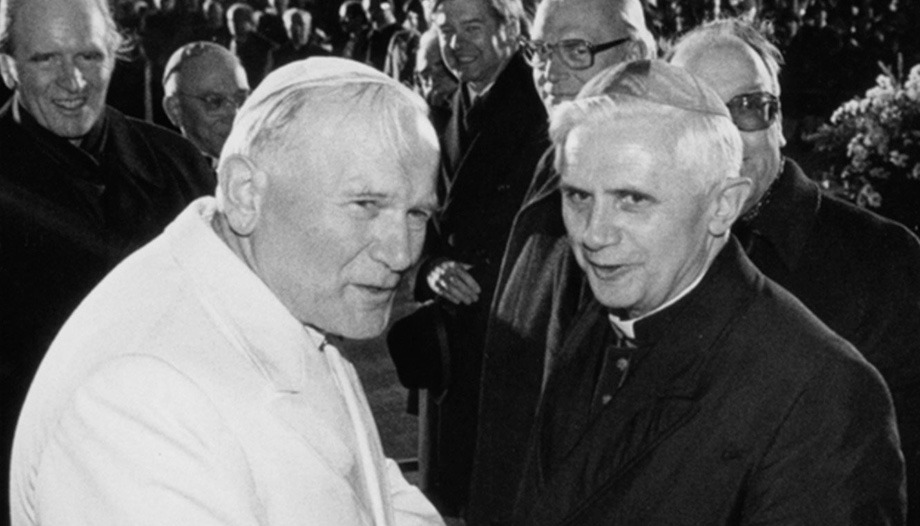
Prefect of the Holy Office
Joseph Ratzinger's life took a new and definitive turn on November 25, 1981, when John Paul II called him to Rome to put him at the head of the Congregation for the Doctrine of the Faith, the Pontifical Biblical Commission and the International Theological Commission. He worked there, in perfect harmony with the Polish Pontiff, for more than 23 years.
John Paul II never wanted to do without that privileged theological head. Cardinal Ratzinger had become his principal and most faithful collaborator, especially when it came to resolving the most difficult doctrinal questions, such as, for example, responding to the so-called liberation theologies or putting him at the head of the Commission for the preparation of the Catechism of the Catholic Church.
On April 5, 1993, John Paul elevated Cardinal Ratzinger to the order of Bishops and on November 30, 2002, he approved his election as Dean of the College of Cardinals, thus making him supervisor of the election of the future Pope.
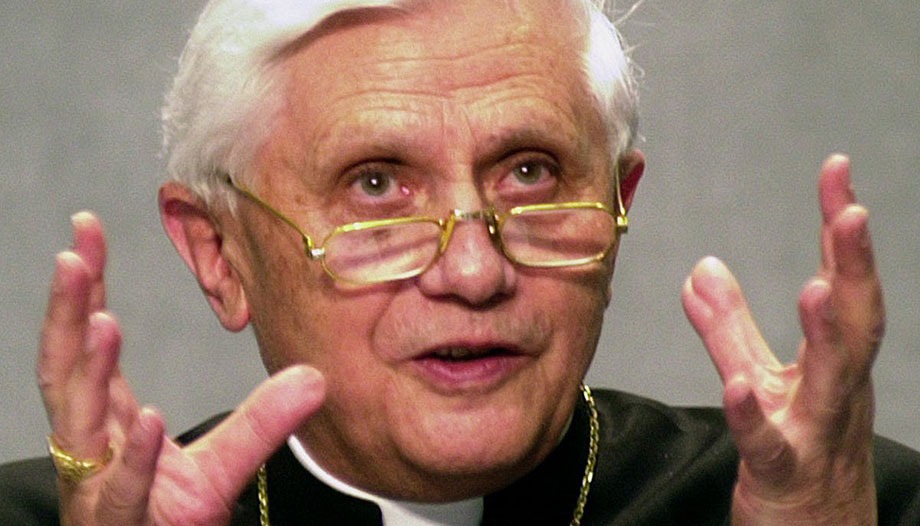
After the death of John Paul II on April 2, 2005, Ratzinger expected that at the end of the conclave his direct service to the Apostolic See would also come to an end. However, the Holy Spirit had other plans for him.
The Pope theologian
The pontificate of Benedict XVI was not even eight years old. The arrival of Joseph Ratzinger to the See of Peter coincided, without a doubt, with the beginning of one of the most difficult periods for the Catholic Church: the serious problem of sexual abuse by clerics and religious, the world economic instability and the change of social paradigm undoubtedly marked the line of the pontificate and his surprising resignation.
As a pastor, the catecheses of the Bavarian Pope constitute a remarkable collection of accessible and precise catechetical formation. His commentaries on figures such as St. Paul and the Fathers of the Church, or the discovery of men and women sometimes unknown to the vast majority of the files make these talks a treasure of faith and Christian formation.
Special mention should be made of his trilogy Jesus of NazarethThe first volume, which came out in April 2007, the second in March 2011 and the third in November 2012, was a true publishing success worldwide. In these books, the Pope unpacks, with enormous depth and absolute knowledge of faith and tradition, the figure of Christ, placing it in perfect dialogue with modern man.
His encyclicals "Deus Caritas est", "Spe Salvi" y "Caritas in Veritate". are the backbone of the Papal Magisterium of Joseph Ratzinger. Along with them, his numerous letters and private messages addressed by the Pope to diplomats, young people, ecclesial movements and new communities, the Roman Curia and other entities of the world stand out.
As Pope, Benedict XVI faced the main problems of the Church. Among the most notable were his efforts to bring to light the cases of sexual abuse within the Church, his meeting with the victims and the establishment of instructions to all the Episcopal Conferences so that these cases would not be repeated. He thus continued the path initiated by his predecessor to eradicate these behaviors within the Church and whose efforts continue to this day.
In addition, under his pontificate, the reform of the Vatican's financial system to adapt it to the norms of international transparency began.
Pope Benedict XVI was noted for his dialogue with non-Christian religions and for his numerous trips around the world. Benedict XVI made 24 apostolic journeysFrom his first visit to Cologne on the occasion of the 20th World Youth Day in August 2005 to his trip to Lebanon in September 2012. Benedict XVI has visited every continent, with stops in Turkey, Brazil, the United States, Sydney, Cameroon and Angola, Jordan, Benin, Mexico and Cuba, as well as other trips to Europe: Poland, Spain, Austria, France, the Czech Republic, Malta, Portugal, Cyprus, the United Kingdom, Croatia and, of course, his homeland, Germany.
In December 2012, Benedict XVI inaugurated, with his first tweet, the account @pontifex on this social network. Currently, the Pope's official account has more than 53 million followers and is written in 9 languages.
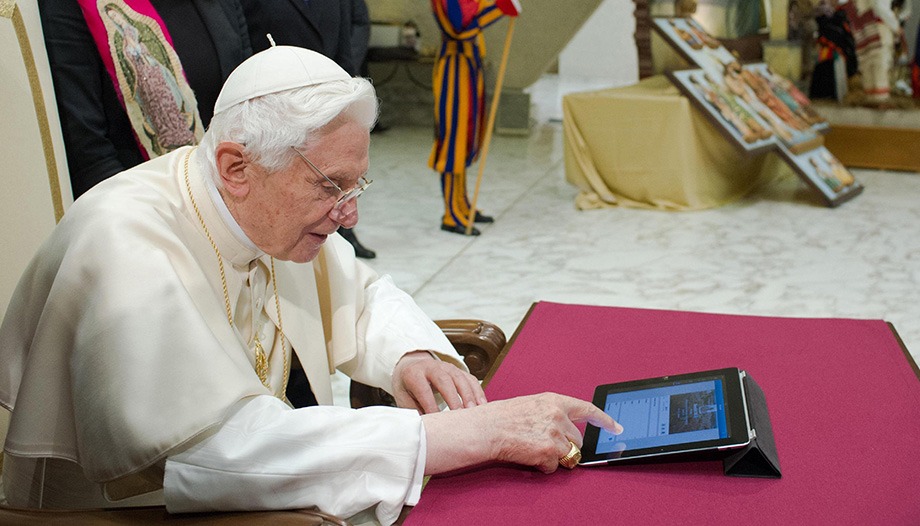
The magnitude of the Church's internal and external problems, as well as the realization of his fragile health, led Pope Benedict XVI to announce, by surprise, his resignation on February 11, 2013, citing "lack of strength". There had not been a papal resignation since 1294, when, tired of internal struggles, Celestine V resigned from the helm of the barque of Peter. Benedict XVI himself had visited the tomb of this pope at L'Aquila. The papal resignation became effective on February 28 of the same year.
After the election of Jorge Mario Bergoglio as successor to the head of the Catholic Church, Joseph Ratzinger became Pope Emeritus and took up residence in the Mater Ecclesiae monastery in Vatican territory.
Last years
Since his resignation from the papacy, Benedict XVI has remained in the background, without many public appearances or publications. On most occasions, images of him have been accessible thanks to Pope Francis' frequent visits to congratulate him on major Christian feasts or personal anniversaries. In April 2014 he participated in the canonization ceremony of John XXIII and John Paul II and, later, in the beatification of Paul VI. He also attended some public consistories of cardinals and opened the holy door in the Jubilee year of 2015.
In 2016 he published a book interview he wrote with journalist Peter Seewald, in which he takes stock of his pontificate and discusses topics such as his young stance on the encyclical Humanae vitae, his relationship with theologian Hans Küng and other topics of his personal life.
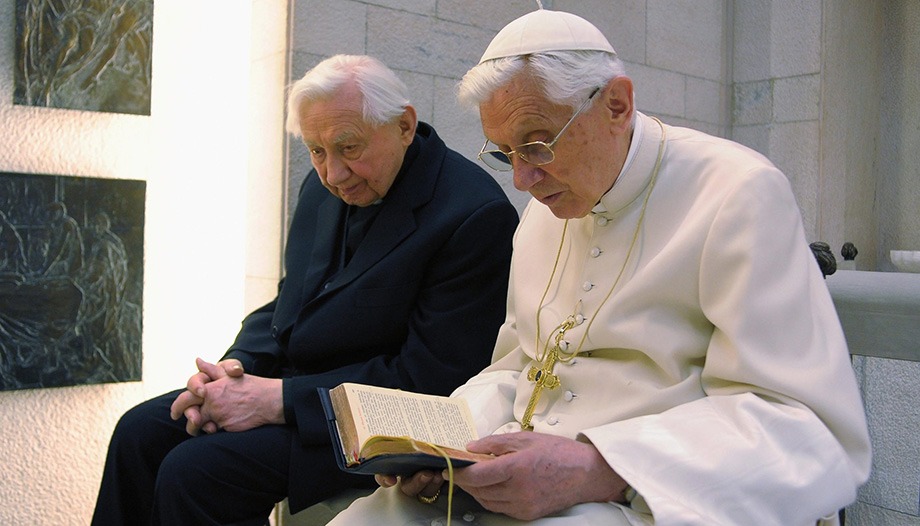
In June 2020 he made a five-day trip to Regensburg to visit his gravely ill brother, Georg Ratzinger, who would die days later. This was the pope emeritus' only trip outside Vatican City after resigning from office.
Early in the morning of December 31, 2022, the Holy See Press Office announced the death of the Pope Emeritus: "It is with regret that I announce that Pope Emeritus Benedict XVI passed away today at 9:34 a.m. at the Mater Ecclesiae Monastery at the Vatican.", the note read.




